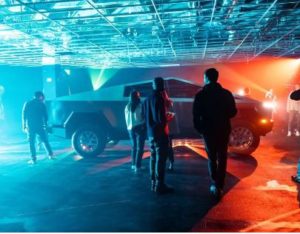
India is closing in on an agreement with Tesla Inc. that would allow the US automaker to ship its electric cars to the country from next year and set up a factory within two years, according to people familiar with the Indian government’s thinking.
An announcement could come at the Vibrant Gujarat Global Summit in January, one of the people said, declining to be identified because the discussions are private. The states of Gujarat, which is Prime Minister Narendra Modi’s home base, Maharashtra and Tamil Nadu are under consideration because they already have well-established ecosystems for electric vehicles and exports, another person said.
Tesla would commit an initial minimum investment in any plant of around $2 billion, one person said and would look to increase purchases of auto parts from the nation to as much as $15 billion. The US automaker would also seek to make some batteries in India to bring down costs, the person said.
No final decision has been made and the plans could change, the people said. Tesla Chief Executive Officer Elon Musk said in June that Tesla plans to make a ‘significant investment’ in India and he intends to visit in 2024.
Representatives from India’s Ministry of Heavy Industries, which oversees the automobile sector, and the ministries of finance, and commerce and industry, didn’t respond to requests for comment. Tesla also didn’t respond to a request for comment.
Breaking into the world’s most populous nation, where demand for electric vehicles is growing among aspirational middle-class consumers, would be a boon for Tesla, which currently has factories in the US, China and Germany. Modi’s government has been pushing to increase domestic manufacturing of EVs and encourage a more rapid adoption of cleaner transport.
Despite those efforts, India’s EV market hasn’t taken off, with battery-powered cars accounting for just 1.3% of the total passenger vehicles sold last year, according to BloombergNEF. Buyers are hesitant to make the switch due to electric cars’ high upfront cost and a dearth of charging stations.
Tesla doesn’t import cars directly into India because of the high tariffs that are levied. When its first locally made cars do go on sale they could retail for as little as $20,000, some of the people said.
Trade Minister Piyush Goyal, who visited Tesla’s plant in Fremont, California earlier this month, said in September that Tesla is planning to almost double purchases of auto parts from India to $1.9 billion this year. The electric carmaker sourced parts worth $1 billion from the nation last year, he said at an event in New Delhi at the time.
Tesla and India, which is the world’s third-largest automobile market, reopened dialogue in May following a year-long impasse. Musk has criticised India’s high import taxes and its EV policies, and India, in turn, has advised Tesla not to sell cars in the country that have been made in China, its political rival.
India is now said to be considering lowering import taxes for international EV manufacturers for five years if those firms eventually commit to setting up local factories.




 Driving Naari Programme launched in Chandigarh
Driving Naari Programme launched in Chandigarh






























